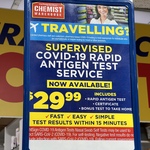Lots of people will be doing supervised RATs for travel… some countries only require them rather than PCR, while others allow recently recovered travellers to do them instead of PCRs. Histopath was offering $59 tests, but Chemist Warehouse is now beating them with $29.95 tests, saving us not just money, but also time (as there’s more Chemist Warehouse locations around). Apparently, it comes with an extra RAT to take home (according to the sign)… perhaps because the RightSign tests come in a set of 2 RATs.
I took the photo at the Hyde Park branch in Sydney. Not sure if it’s available at all branches. Can’t seem to find more info on their website, but it’s on their YouTube page: https://youtu.be/YokX195XW5A




Not sure what they mean, but according to Singapore requirement, it stated that it must be professionally administered. So I'm thinking that this has to be done professionally with a pathology lab and someone has to do it for you. This supervised is just the pharmacist watching you do it and verify the info is correct. Which countries required just supervised?